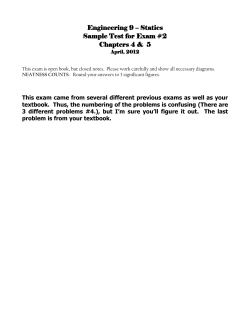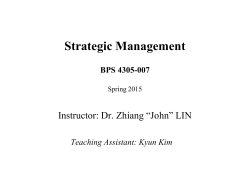
Syllabus - Regis University: Academic Web Server for Faculty
Syllabus Course Number: CS 450 Course Title: Data Networks Course Description: This course introduces the concepts and terminology of data communications and network design. Course topics include transmission techniques, network topologies, protocols, security, network control, and network architectures. Prerequisite Courses: CS 208 Computer Science Fundamentals and CS 362 Control Structures Course Overview The object of this course is to create the foundation upon which network implementations can be designed, analyzed, and improved upon. In addition, you will become aware of how the network infrastructure provides a mechanism for supporting new and ever beneficial applications. This course will provide the background information required to support good decisions concerning all aspects of the network. Course Outcomes: Upon completion of this course, learners should be able to: 1. Provide a unified overview of the broad field of data and computer communications, 2. Identify the basic principles of data communications and network design that unify this field, such as multiplexing, flow control, and error control, 3. Recognize alternative approaches to meeting specific communication requirements, 4. Explain how standards play an increasingly dominant role in this field, 5. Identify the requirements for data communications such as encoding, signaling, synchronization, media, and protocols, 6. Describe the need for security in the data communications environment and the solutions used to achieve secure communications, and 7. Explain the business need for interoperability and describe how internetworking devices and protocols are used to accomplish that end. College for Computer & Information Sciences | 3333 Regis Boulevard, Denver, CO 80221 | 303-458-6884 | regis.edu ©2015 Regis University Revised: 5/29/2015 Page 1 of 6 8. Design, implement, test, and validate code elements used in support of data networks. Course Materials: Required Texts: Kurose James F. & Ross Keith W., (2013). ComputerNetworking, A Top Down Approach. (6th edition). Addison-Wesley (Pearson Education); ISBN: 978-0-13-285620-1. Technology Tools: 1) Access to a PC-compatible computer system running Windows. 2) IP Subnet Calculator; can download from: http://www.wildpackets.com/products/free_utilities/ipsubnetcalc/overview 3) A C++ Compiler (Dev-C++ free download) http://sourceforge.net/projects/orwelldevcpp/files/Setup%20Releases/ Download the most recent version: Dev-Cpp x.x.x MinGW x.x.x Setup.exe (32-bit version) OR Dev-Cpp x.x.x TDM-GCC x64 x.x.x Setup.exe (64-bit version) 4) A Java Compiler: http://java.oracle.com NOTE: The compilers will be used to complete the programming assignments. Other compilers can be used, but the facilitator will be most familiar with the compilers listed above, and will most likely use the compiler to grade your programs. If a student chooses to use another compiler, it is the student's responsibility to obtain any help needed to use the software, and to insure that all assigned programs compile correctly on the compiler. 5) Wireshark Packet Analyzer: www.wireshark.org 6) Wireshark Users Guide. http://www.wireshark.org/docs/wsug_html Supplemental Materials: Palmer, M. and Sinclair, R.B. (2003). Guide to Designing and Implementing Local and Wide Area Networks. (2nd ed.). Boston: Thompson Course Technology. Marcus, J. S. (1999). Designing Wide Area Networks and Internetworks. Upper Saddle River: Addison-Wesley. Stallings, W., (2007). Data and Computer Communications. (8th edition). Upper Saddle River, NJ: Prentice-Hall; ISBN: 0-13-243310-9. Week 1 Java Applets that reinforce the subjects discussed in Chapter 1 of the textbook: o http://media.pearsoncmg.com/aw/aw_kurose_network_2/applets/transmission/delay.html ©2015 Regis University CS450 Syllabus Page 2 of 6 o http://media.pearsoncmg.com/aw/aw_kurose_network_2/applets/queuing/queuing.html o http://media.pearsoncmg.com/aw/aw_kurose_network_2/applets/message/messagesegme ntation.html Wireshark video tutorial: o http://media-2.cacetech.com/video/wireshark/introduction-to-wireshark/ Week 3 Java Applets that reinforce the subjects discussed in Chapter 3 of the textbook: o http://media.pearsoncmg.com/aw/aw_kurose_network_4/applets/go-back-n/index.html o http://media.pearsoncmg.com/aw/aw_kurose_network_4/applets/SR/index.html o http://media.pearsoncmg.com/aw/aw_kurose_network_4/applets/flow/FlowControl.htm o http://media.pearsoncmg.com/aw/aw_kurose_network_4/applets/fairness/index.html Week 5 Java Applets that reinforce the subjects discussed in Chapter 5 of the textbook: o http://media.pearsoncmg.com/aw/aw_kurose_network_2/applets/csmacd/csmacd.html Pre-Assignment: • READ Chapter 1 in the text. • Read pages 80-81 in the Wireshark Users Guide http://www.wireshark.org/docs/wsug_html • Be prepared to ask questions on unclear areas in the assigned reading. Online Format: Sign on to worldclass.regis.edu and become familiar with the course navigation of the Web Curriculum. Complete assignments above. Classroom-based Format: Complete assignments above by the first night of class. ©2015 Regis University CS450 Syllabus Page 3 of 6 Course Assignments and Activities Topics 1 2 • • Data Communication & Networking Concepts Application Interfact (API) Concepts Readings Activities Assignments and Associated Points Participation in Discussions (10% for entire course) Textbook: Ch. 1, pp. 1 – 67 Wireshark: pp. 80 – 84 Textbook: Ch. 2, pp. 83 – 168 and 179 – 180 Wireshark lab: pp. 192 - 195 Assignment #1 (10%) Participation in Discussions Assignment #2 (10%) 3 • Transport Layer Concepts 4 • Network Protocols Concepts 5 • Link Layer & Local Area Network Concepts Textbook: Ch 5, pp. 433 – 501 Wireshark: pp. 520 – 522 The Physical Layer Concepts Textbook: Ch 6, pp. 513 – 578 Etherreal Lab: pp. 59 and 594 – 596 Participation in Discussions Textbook: Ch. 8, pp. 671 – 743 and 753 Textbook: Ch. 9, pp. 771 – 800 803-804 Textbook, Ch. 7, pp. 587 – 655 Assign. pp. 682 and 684 – 686 Participation in Discussions 6 7 8 • • • Security and Internetworking Concepts Multimedia Network Concepts Textbook: Ch. 3, pp. 185 – 284 Wireshark (312, 313-314) Textbook: Ch 4, pp. 305 – 412 and 438 – 439 Participation in Discussions Assignment #3 (10%) Participation in Discussions Assignment #4 (10%) Participation in Discussions Assignment #5 (10%) Assignment #6 (10%) Assignment #7 (10%) Participation in Discussions Assignment #8 (10%) Total Final Exam** (10%) 100% First night assignment is due on the first day of class, other assignments at the end of the week (online) or the beginning of the next class. ** Your facilitator may optionally assign a final exam. Course Policies Late Assignment Policy If you have not negotiated something different with your facilitator, late assignments will be graded and then 3% will be deducted for each day the assignment is late, up to one week late. No assignment will be accepted more than one week after the official due date. Week 8 assignments will not be accepted more than 3 days late. ©2015 Regis University CS450 Syllabus Page 4 of 6 Student Evaluation Summary Assignment Value (percent of overall course grade)** With Final Without Final Participation 10% 10% Assignments 1-6 10% 11% Assignments 7-8 10% 12% Final** 10% none TOTAL 100% 100% **Your facilitator may assign a final exam. If a final exam is assigned, the percentages are taken from the left-hand column, otherwise the right-hand column is used. CC&IS Grading Scale Letter Grade Percentage Grade Point A A– B+ B B– C+ C C– D+ D DF 93 to 100 90 to less than 93 87 to less than 90 83 to less than 87 80 to less than 83 77 to less than 80 73 to less than 77 70 to less than 73 67 to less than 70 63 to less than 67 60 to less than 63 Less than 60 4.00 3.67 3.33 3.00 2.67 2.33 2.00 1.67 1.33 1.00 .67 0 Additional information about grading can be found in the latest edition of the University Catalog, available at http://www.regis.edu/Academics/Course%20Catalog.aspx. CC&IS Policies and Procedures Each of the following CC&IS Policies & Procedures is incorporated here by reference. Students are expected to review this information each term, and agree to the policies and procedures as identified here and specified in the latest edition of the University Catalog, available at http://www.regis.edu/Academics/Course%20Catalog.aspx or at the link provided. • The CC&IS Academic Integrity Policy. • The Student Honor Code and Student Standards of Conduct. ©2015 Regis University CS450 Syllabus Page 5 of 6 • Incomplete Grade Policy, Pass / No Pass Grades, Grade Reports. • The Information Privacy policy and FERPA. For more information regarding FERPA, visit the U.S. Department of Education. • The HIPPA policies for protected health information. The complete Regis University HIPAA Privacy & Security policy can be found here: http://www.regis.edu/About-RegisUniversity/University-Offices-and-Services/Auxiliary-Business/HIPAA.aspx. • The Human Subjects Institutional Review Board (IRB) procedures. More information about the IRB and its processes can be found here: http://regis.edu/Academics/AcademicGrants/Proposals/Regis-Information/IRB.aspx. The CC&IS Policies & Procedures Syllabus Addendum summarizes additional important policies including, Diversity, Equal Access, Disability Services, and Attendance & Participation that apply to every course offered by the College of Computer & Information Sciences at Regis University. A copy of the CC&IS Policies & Procedures Syllabus Addendum can be found here: https://in2.regis.edu/sites/ccis/policies/Repository/CCIS%20Syllabus%20Addendum.docx. ©2015 Regis University CS450 Syllabus Page 6 of 6
© Copyright 2025












